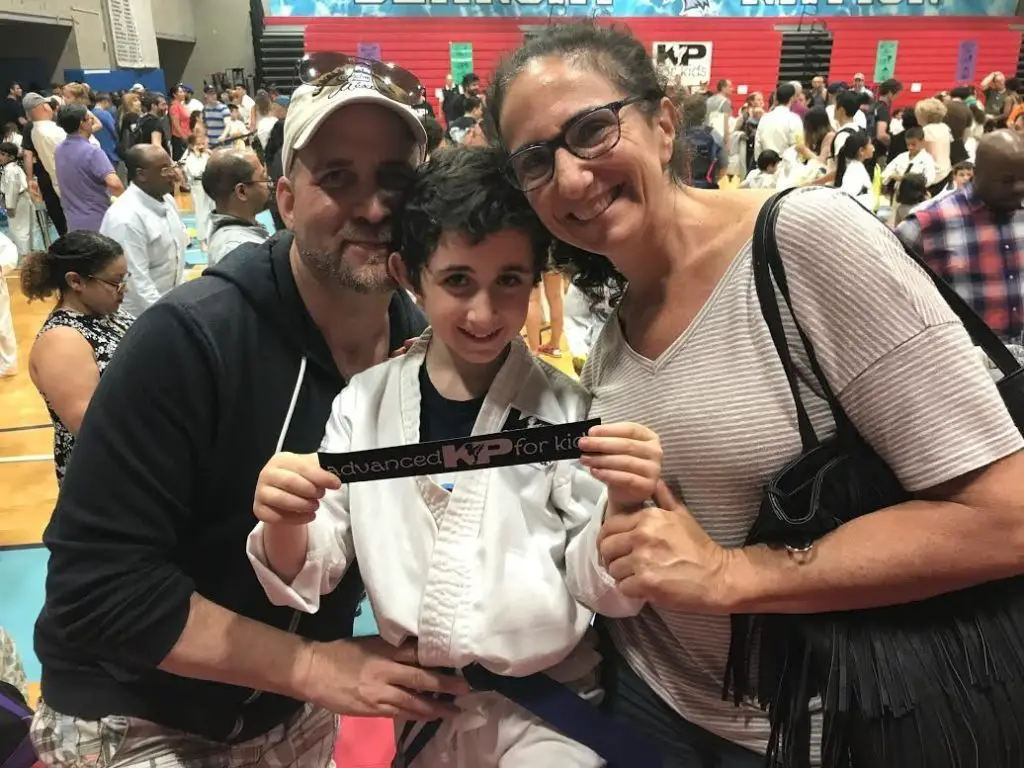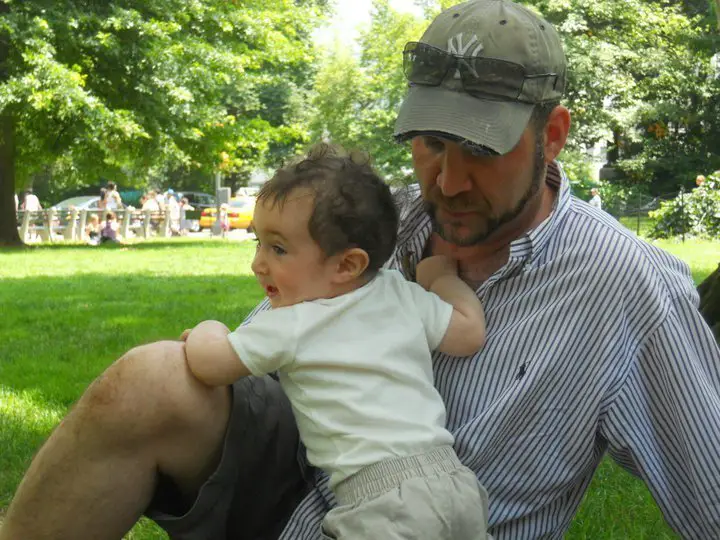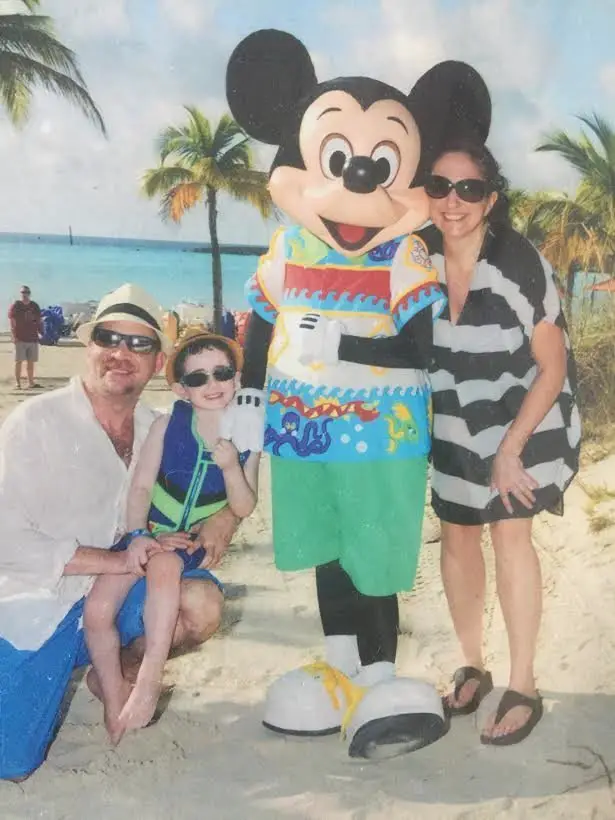
David Arrick, Nate and Heidi at Nate’s karate class exposition in New York City in 2017.
David Arrick, a former New York attorney and a baker, learned his father was a gay when he was just 11. After a couple of years, he also came out of the closet. Now he was being gay but also wanted to have offspring one day. Would coming to terms with his sexuality prevent him from becoming a father one day? Certainly not. The first thing he learned from his role model, his Dad, was that being gay doesn’t mean being childless.
He is now sharing the story of how he and a straight woman are co-parents of their son. His writing was first published in the Huffington Post, and later shared throughout the social media, thus dividing people’s opinions of whether these types of relationships meet the ‘society’s standards.’
You can take a look at what David had to say in his essay below.
“When I was 11, I found out that my dad was gay. As shocking as this revelation was, I was relieved his sexuality was the reason my parents divorced and that my dad hadn’t left my mom to start another family that he loved more than ours. Still, I was confused. This was 1978, and there were no healthy representations of gay people in the media, and I had absolutely no idea what having a gay dad would mean for me.
Then, just when I was starting to accept my father’s sexuality, I began to question my own, and by the time I turned 16, I came out as gay too. Despite the emotional turbulence my dad and I had been through, I counted myself lucky. Not only did I have a role model in my own family, but thanks to my Dad, I had already learned something so many other gay people at my age hadn’t: Being gay didn’t have to equal being childless.
That message stuck with me throughout my life, and 25 years after I came out, when my friend Heidi, who I met at college, and I began discussing having a child together, I did not feel the same apprehension that plagues some other gay men. Heidi was essentially family to me, and we viewed having a child as a natural extension of our close friendship. We were both single, our families knew and liked each other, and we spent many holidays together. We laughed at the same things, had lots in common and both felt a burning desire to be parents. Comments like “If neither of us is married by …” or “Could we co-parent together?” had been peppered throughout our conversations for years, and when we seriously began to discuss it, we were hard pressed to think of a reason we shouldn’t do it. It just felt right.
By 2010, when we decided to put our plan into action, media representations of alternative parenting approaches and family types had come a long way. Miranda and Carrie had discussed their biological clocks on “Sex and the City” and revealed their “scary age,” or age at which they feared they would realize it was too late to have a baby. “Will & Grace” and “Modern Family” were opening closets and shining a bright light on modern gay life while offering new definitions of family. Even though there were still no visible gay-dad-straight-mom co-parenting role models for us to look to, there were so many more possibilities when it came to parenting, and Heidi and I felt determined to make our own version of a modern family a reality.

David and Nate in New York City’s Central Park in 2011.
Navigating uncharted waters, we would be forging ahead guided solely by instinct, but what prospective parents aren’t essentially doing that in most respects, right? There were no books on Amazon titled “Gay Dad, Straight Mom” or “When Your Gay BFF Becomes Your Baby Daddy,” and there were so many issues ― from the legal to the financial ― to iron out, but those were really just details to us. I felt that as a “couple,” we were at a distinct advantage, and I remember thinking, “Aren’t Heidi and I in a better position than many other people who get pregnant without having had the benefit of 20 years of friendship?” In our hearts we knew we were doing the right thing, and in our minds we had already become Daddy and Mommy. So with our plan concealed from family and friends, we set out to try to conceive.
The idea of having sex made us chuckle, so we decided on at-home insemination without any kind of medical intervention. Since Heidi is a nurse, we had the benefit of her medical background, and we obtained the sterile cups, syringes and the other paraphernalia needed to increase our odds of conception. We agreed that if Heidi didn’t get pregnant within three months, we would each go to a fertility doctor to determine if we were individually able to have children. If my boys were the reason that Heidi couldn’t get pregnant, I would have been disappointed but graciously bowed out of the process, wishing her well in her journey toward becoming pregnant without me. I gave it my best shot (literally!), and we inseminated whenever Heidi was ovulating.
We made the insemination process as lighthearted as we could because, while we were attempting to do something that, if successful, would alter our lives forever, there was a comical aspect to the process of doing this ourselves. Here we were actually doing what so many other gay men and their straight college girl friends had promised each other they would do, and the faint sound of their words ― “If I’m not married by 40 …” “You’re my gay BFF. We should have a baby!” ― echoed in our heads throughout our journey.
Here we were actually doing what so many other gay men and their straight college girl friends had promised each other they would do.
On insemination night there was no mood lighting, no chardonnay and no Barry White playing. Instead we told each other funny stories after the process was complete. Heidi remained lying on her bed, hips raised at an angle to increase the odds of sperm meeting egg, with Led Zeppelin playing (Heidi sings in a Led Zeppelin cover band, after all), a “Seinfeld” rerun on TV and cartons of our favorite Chinese takeout within reach. After our third attempt, Heidi became pregnant. Apparently steamed shrimp dumplings plus “Stairway to Heaven” plus some Jerry, Elaine, George and Kramer craziness equaled success ― at least for us.
Throughout the pregnancy, I remained awestruck that the sonogram images of the baby in Heidi’s belly were of my child, and I found myself marveling at the fact that the in-home insemination really worked. We worked out that Heidi would have primary custody during the week, I would have the baby at my place on the weekend, we would share finances and we would create a Family Day ― one day dedicated to our all being together ― that we would share each week.
In September 2010 our son, Nathaniel Chase, was born. We hadn’t attended one Lamaze class, since he arrived before they were scheduled to start, but Heidi was a confident champ, masterfully in tune with herself and what her body was naturally designed to do. I was steadfastly there by her side ― cheering her on and holding a knee when helpful but scurrying to move my daddy ass out of the way when the nurse screamed at me to do so. After Nate was born, we had an impromptu “circle of life” moment (cue “The Lion King”) to welcome him into the world and then had Chinese food delivered to the hospital room.

David with Nate and Heidi in the Bahamas in 2015.
What I came to realize after our son was born was that our situation as parents was more similar to than different from those who became parents in what we now think of as a more traditional way. Our co-parenting story garnered some media attention, and we appeared on NBC, CNN and other networks with the intention of showing that we were an alternative family proud of our journey. We thought (and still think) of ourselves as simply Mommy and Daddy ― there to guide, educate, love and raise our child, just as millions of other parents do every day. My sexuality and Heidi’s choice as a single woman to become a mom were not at all relevant to our abilities to parent, and while our identities may have changed how we got to where we are today, ultimately, they do not define us as parents.
Parenting as a gay man has been interesting, to say the least. In addition to experiencing many of the typical things that a first-time father experiences, I often find myself in situations other dads might not. In 2012, I was in a Starbucks when a well-intentioned grandmotherly type approached me and asked what so many others have asked me over the previous two years when they saw me alone with Nate: “Is it Mommy’s day off today? Are you babysitting?” Unfortunately for her, she chose the wrong guy and the wrong day to inquire and I told her what I’d been itching to tell the dozens of people who had asked me similar questions before. “I’m gay,” I responded. “How do you know that my child’s other parent is a woman, or that there even is a mommy?” The woman turned whiter than the foam on her latte.
I don’t entirely fault her for seeing a man with a baby through a more traditional lens, probably as a result of being the product of her older generation, but I’d be lying if I said I didn’t feel a rush of satisfaction from responding the way I did. And to be honest, I also take issue with the idea that if a man is alone with a baby, that automatically means he’s babysitting or temporarily stepping into mom’s shoes when she’s not around. Men parent too, and they aren’t babysitters to their own kids.
My sexuality and Heidi’s choice as a single woman to become a mom were not at all relevant to our abilities to parent, and … ultimately, they do not define us as parents.
Another time I was texting with a gay friend, and he told me that he was on his way to have a threesome. “Look what you’re missing out on by having to be home on a Saturday night with your toddler!” he wrote. “Will you ever be able to go out again?”
I was never interested in threesomes before my son was born, but that was beside the point. It wasn’t my job to convince him that I was happy or that there was nowhere else I would rather be on a Saturday night than at home reading “Goodnight Moon” to the most important little guy in my world.
My family is everything to me, and I’m thankful for what I’ve been able to experience because of the people I love. I’m especially grateful for Heidi and the way that becoming parents together morphed our relationship from best friends to something even richer and deeper and built on even more trust and respect than we had for each other before. We work hard to discipline Nate consistently in our respective homes, communicate daily and try our best to parent as a united front. Not everyone supports what we are doing, and we’ve faced many challenges (including some despicably misogynistic and homophobic comments), but we expected that to some degree, and we’ve learned to tune out that ugly noise and focus on what is most important ― raising Nate and being a positive example of what a loving, modern family looks like.”
